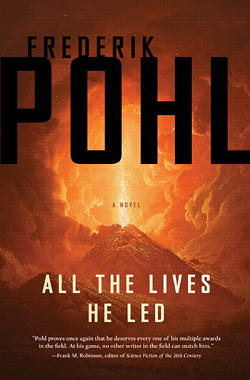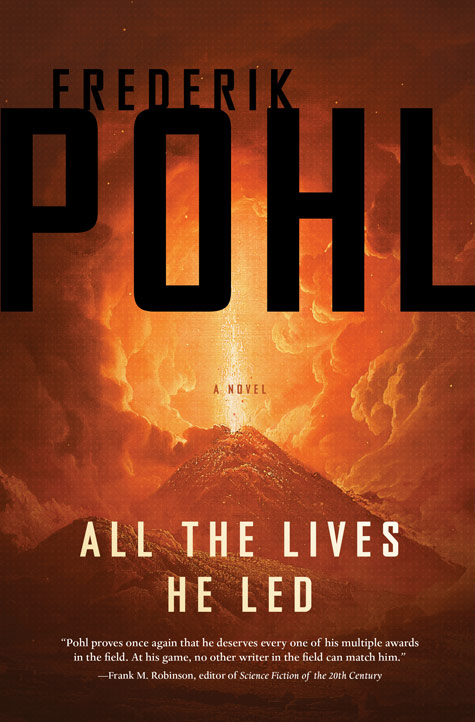 Please enjoy this excerpt from All the Lives He Led, a new novel by Frederik Pohl, out on April 12th from Tor Books.
Please enjoy this excerpt from All the Lives He Led, a new novel by Frederik Pohl, out on April 12th from Tor Books.
***
“What?” the woman asked.
“It is not important,” he said. “I simply wonder if it mightn’t be better to open him all the way up.”
She gave him an unfriendly smile. “If employment of the amphiprobe should prove to be indicated,” she informed him, “I will make that decision myself and will then request the colonel’s permission to go as deep as necessary. Now you, Sheridan”— she was turning to me—“let us cover this matter again, this time without omitting important facts.”
Right then I figured I was out of luck for good, and the best thing that might happen to me was that they’d put me on the next ship back to Egypt and its tax authorities and religion police and sand. Even that might be better than staying here. At least the Egyptians had been forgiving enough, or incompetent enough, to never mention Uncle Devious.
I said, “I don’t know what you’re talking about.”
Of course I did know. I knew all about my Uncle Devious’s secret criminal side, because of all the things that my father and mother had said to each other when they didn’t know I could hear. It was pretty clear that I didn’t know as much as the Security people did, though. After I told them, over and over, that I had truthfully answered every question on the Giubileo employment application, they reluctantly admitted that, no, there hadn’t been any question that asked if I had an uncle by marriage who was accused of funding terrorists. Then they just began asking, fairly civilly, or almost, for me to tell them everything I remembered about my Uncle Devious.
So I told them everything I remembered, until they began looking bored. I won’t say that satisfied them. It did send them back to the corner to mutter at each other again, though. Leaving me standing there to wonder, a. how much deep shit I was in, and, b. what this meant to my never quite abandoned hope of finding Uncle Devious myself and squeezing my mother’s money out of him.
When they came back they answered one part of that. “Let me show you something,” the man said. He touched parts of the keypad on his tunic. Across the room a screen lit up. What it was displaying was the face of a handsome man with a pencil mustache and just a few glints of gray in his neatly brushed hair. “Holy shit,” I said, “that’s Uncle Devious. DeVries, I mean.”
The woman said, “Yes, this is how this Reverend Mr. Maddingsley looked when he went underground with his stolen funds.”
“What he swindled out of my mother plus my aunt’s three-million-buck trust fund,” I agreed. And that $3 million was in real 2062 dollars, before the post-Yellowstone inflation.
“Oh, more than that,” the woman said seriously.
“Very much more than a minor embezzlement from members of his family,” Swinn agreed. “We don’t really know how much. But, yes, quite a lot. At any rate, that is how he looked when the search began”— more pat-a-pat on his blouse keypad—“and this is how he looked on April 25, 2059, when this other picture was taken. He had just recovered from his plastic surgery.”
The new picture on the screen didn’t look anything like Uncle Devious anymore. For one thing, the smiling man it displayed was black, or coffee-cream color, anyway. He was also nearly bald. He wore neatly trimmed sideburns with a tiny sprout of white beardlet coming out of the dimple in his chin, which was nowhere near as manly as Uncle Devious’s.
“That was taken at his estate near Ocho Rios in Jamaica,” the woman was going on. “Three days later the local police found him, but someone else had found him first. Then he looked like this.”
I’ve seen plenty of sickening sights in my life but never one more sickening than that. The man was now naked and on a morgue pallet. He didn’t have any genitals. They had been hacked off . He didn’t have any eyes, either—gouged out, nothing left but bloody pits over where his nose, too, had been cut away. There’s no point saying how many other places on his body had been cut, stabbed or gouged. I didn’t count. I didn’t vomit, either, but it was a close call.
“It was definitely Delmore DeVries Maddingsley,” Swinn told me.
“DNA match. Such matches are commonly made in America, where police have more freedom than we have with the do-gooders in Eurocenter in Brussels—”
The woman turned to look at him. She didn’t speak, but the male swallowed hard and abandoned the subject of do-gooders in Brussels. He said, “We think we know who did it to him—Brian Bossert, the guy who did the Boston Tunnel and San Francisco BART blowups. He’s dead, too. He got it in the Lake Ontario oil attack later that year. But we never found the money.”
“What was left of it,” the woman said.
“We did find the surgeon who rebuilt Maddingsley into that rather good-looking Negro,” Swinn said. “All the surgeon got for it, though, was a year in prison. Should’ve thrown the key away. There were some money judgments, too—he had to repay what Maddingsley had paid him, and of course we sold Maddingsley’s estate and all his stuff . We think Maddingsley had a lot more squirreled away, though. We’re still looking for it.”
“And we’re not the only ones,” the woman said. “Some appear to believe that the funds were banked with the Stans.”
“Which is of interest to us,” Swinn added, “because of Mrs. Maddingsley’s use of somadone, which comes from the Stans, and we wonder whether your uncle made trips there to secure it for her.”
I thought they were beginning to get silly, but I just shook my head. “I don’t know.”
Swinn sighed. The woman gave him another reprimanding look, but after a moment she sighed, too. “Very well,” she said, “you can now go.”
That was it. They pointed to the door. As I opened it, the woman said, “You have displayed a very sloppy attitude toward providing the Security force with essential information, Sheridan. Do not do this again. Be sure you attend your antiterrorist orientation sessions. Do not miss any of them.”
And the man said, “You’re very lucky in the employment you have been offered here, Sheridan. You don’t want to lose it. The soft-coal distillation mines at Krakow are always looking for new Indentured workers.”
And the woman said, “You’ve made a bad start, Sheridan. You can repair it. If you observe anything suspicious among the people you will be working with report to me at once. My name is Major Yvonne Feliciano. To reach me use any communications facility in Pompeii and ask for my code name, which is Piranha Woman. Do it.”
That was the end of the interrogation.
On my way out I saw my former fellow passengers sprawled out in the waiting room and eyeing me with malice as I passed through. Obviously they had been made to wait while I went through my own inquisition. I was a little sorry for them. Maybe a little sorrier for myself, with the news about Uncle Devious. I hadn’t expected that information to come out of this particular interview. But there it was.
I tried to put it all out of my mind. For a while I succeeded.
© 2010 by Frederik Pohl











Soft coal distillation…does Pohl _still_ have his allergy to atomic power?
@BMunro: sure, cause in 50 years time everything will be driven by nuclular power, from cars on the Florida highways to Ruandan cooking pots…and puppies will fly out of your butt.
BMunro, I’m not sure he’s presenting soft-coal distillation as a good thing, or the only possible future method of power generation.
SenseForAllergy, how old would those puppies be? I’ve never had that happen to me personally, and it would make a lot of difference to the overall experience.
@@@@@ tnh, if past novels like Jem or the Gateway novels are anything to go by, the soft-coal distillation is almost certainly being present as a bad thing – or at least, as a rather desperate and short-sighted stop-gap in a world at risk of going all the way to hell.
I’m really rather looking forward to this. The novel, that is, not the future I’m guessing Polh is projecting.
Ed-rex @@.-@: It’s an inherently gunky process, at least in all its currently known forms.
Whatever else Pohl is projecting about the overall energy-generation scenario, I took “The soft-coal distillation mines at Krakow are always looking for new indentured workers” as a nicely compressed self-explanatory threat. These days, “indentured worker” pretty much means “slave labor without the obligations of ownership.” If this distilled-coal operation has to use indentured labor, I assume free workers won’t put up with the conditions there, and management isn’t trying to improve them. And if they’re constantly looking for new indentured workers, it’s because they’re using them up.
I expect you knew all that too, but it’s fun to unpack it.
@tnh:
Exactly. Much like “salt mines in Siberia.” A lot of info packed into one sentence. No need for a long exposition that they are not a place you want to be. Excellent.
To unpack _my_ comments, between solar, nuclear, wind, thermal-differential using the oceans, etc. the only way to assume that we’ve still got the coal monkey firmly on our back in the 2060s is to consciously assume a Grim Meathook future, to steal Nicoll’s term. Of course, throwing in a Yellowstone eruption would seem to be a Pro-Meathook maneuver.
And when did I claim I thought Pohl was presenting the use of coal as a _good thing_, Assumey Mc Assume-pants? OF COURSE this is a Bad Thing. We’ve had miserable coal-digging serfs in Pohl stories going back to “Gateway”: my complaint is that he never seems to see any alternate options.
Bruce
They don’t want soft coal for power, cause nukes are cheaper than the deep, high ash, high sulfur, high water, high transport cost coal we have left. They want it because it is soft coal as distinct from hard coal and gives you lots of liquids (coal oil, coal tar) on distillation. Presumably the oil is gone by now, and it’s still cheaper to mine coal than oil shale. At least, if you aren’t worried about using up your workers.
Copyediting note: Pohl’s name is misspelled as “Frederick,” not “Frederik,” in the blue byline at the top of this page. Maybe this isn’t the place to point it out, though.